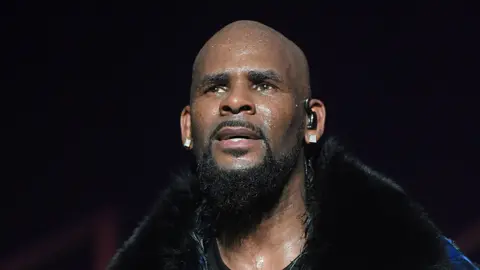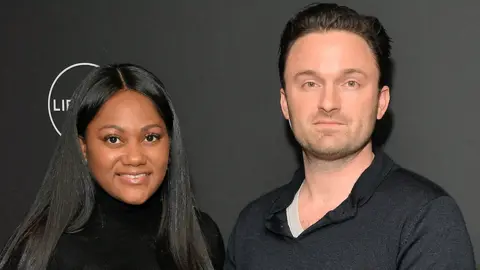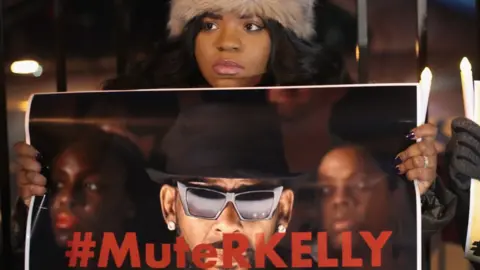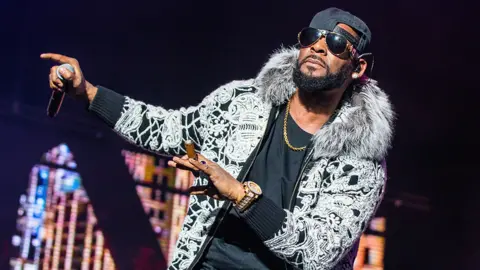Surviving R Kelly makers: 'This isn't where the story ends'
 Getty Images
Getty ImagesWhen the documentary Surviving R Kelly premiered in New York in December, the screening room had to be evacuated because of an anonymous gun threat.
For Jesse Daniels, one of the documentary series' executive producers, that "was a big wake-up call... that this was very serious".
In the audience were some of the women interviewed for the series, who have accused R Kelly of sexual and physical abuse. He denies those claims.
"We were very worried for them and their safety," says Jesse - not just on the night, "but also triggering new feelings and emotions on top of everything that they've already been through."
Allow Google YouTube content?
Although the threat turned out to be "non-credible" according to police, the incident showed Jesse how much responsibility the documentary makers have to its subjects.
The documentary makers say they have an ongoing responsibility to look after the women who are asked to describe accusations of abuse and imprisonment in detail on camera.
"We constantly still check in with our survivors," Jesse tells Newsbeat.
"Lifetime (the US channel) has been an incredible network both in helping us to put this together, but also behind the scenes to make sure that the survivors have the care that they need."
 Getty Images
Getty ImagesWhile the documentary features a lot of people who had told their stories of abuse to journalists before - which the makers are quick to acknowledge - its release does seem to have made a big impact.
This week, lawyer Michael Avenatti said he had delivered new information, including a video tape of sexual abuse, to the Cook's County State Attorney.
Mr Avenatti claims to have support from lawmakers, but the State Attorney told Newsbeat they "cannot confirm or deny an investigation."
Tamra Simmons, another executive producer of the documentary, says she has had messages from survivors of sexual assault since the series aired in the US.
"A lot of them didn't have any therapy for 15 years and thought they were over it," she tells Newsbeat.
"Once they watched the documentary, they realised they weren't over it and it was kind of just swept under the rug.
"Now they have this courage to be able to speak out."
Allow Google YouTube content?
The impact of the documentary has also been seen in the US, with lawyers in Chicago and Atlanta asking potential victims and witnesses to come forward.
Some Philadelphia City Council officials made a public declaration that the singer isn't welcome in the city.
R Kelly's representatives have threatened to sue the documentary makers and its interviewees, although Jesse says they "haven't received anything" so far.
While Tamra and Jesse aren't sure they'll make another series on R Kelly, they're keen for the story not to end as it stands.
"There are girls who are still with him, and their families are fighting to get their daughters back," says Tamra.
"It's not something that has to be documented or anything like that."
 Getty Images
Getty ImagesAnother reason for the series' impact, according to the makers, is the series of allegations against powerful people in the entertainment industry.
"I don't think we could have put this out without the Me Too movement," says Jesse.
"Five years ago if we'd tried to put this together, we don't know if it would have been received or welcomed the same way."
Tamra agrees: "[Me Too founder] Tarana Burke really helped any woman of colour be able to speak out and have that support."
She says the fact that R Kelly's accusers are black women means "their voices weren't heard before, they weren't believed before.
"It's said that if you're a 14 or 15-year-old African American woman and you're dressed in a certain way, or you're attracting older men, then you're considered to be very promiscuous.
"We continue to try to educate people that it doesn't matter what their race is."
 Getty Images
Getty ImagesR Kelly and his record label have reportedly ended their working relationship, the singer continues to be played on radio and streaming services and recently announced a tour of Australia, New Zealand and Sri Lanka.
"There's always going to be an ongoing debate about separating the art from the artist," says Jesse.
"In our case right now, and many people who talked to us after they watched the documentary, it's hard for them to listen to R Kelly's music at that point. Ultimately it's on the individual."
Tamra is "not shocked" that people continue to listen to his music.
"The only thing that we can do is put it out there, and R Kelly just happens to be the subject matter.
"But this kind of thing happens all the time with women and their silence. So it's more about them than it is him."
